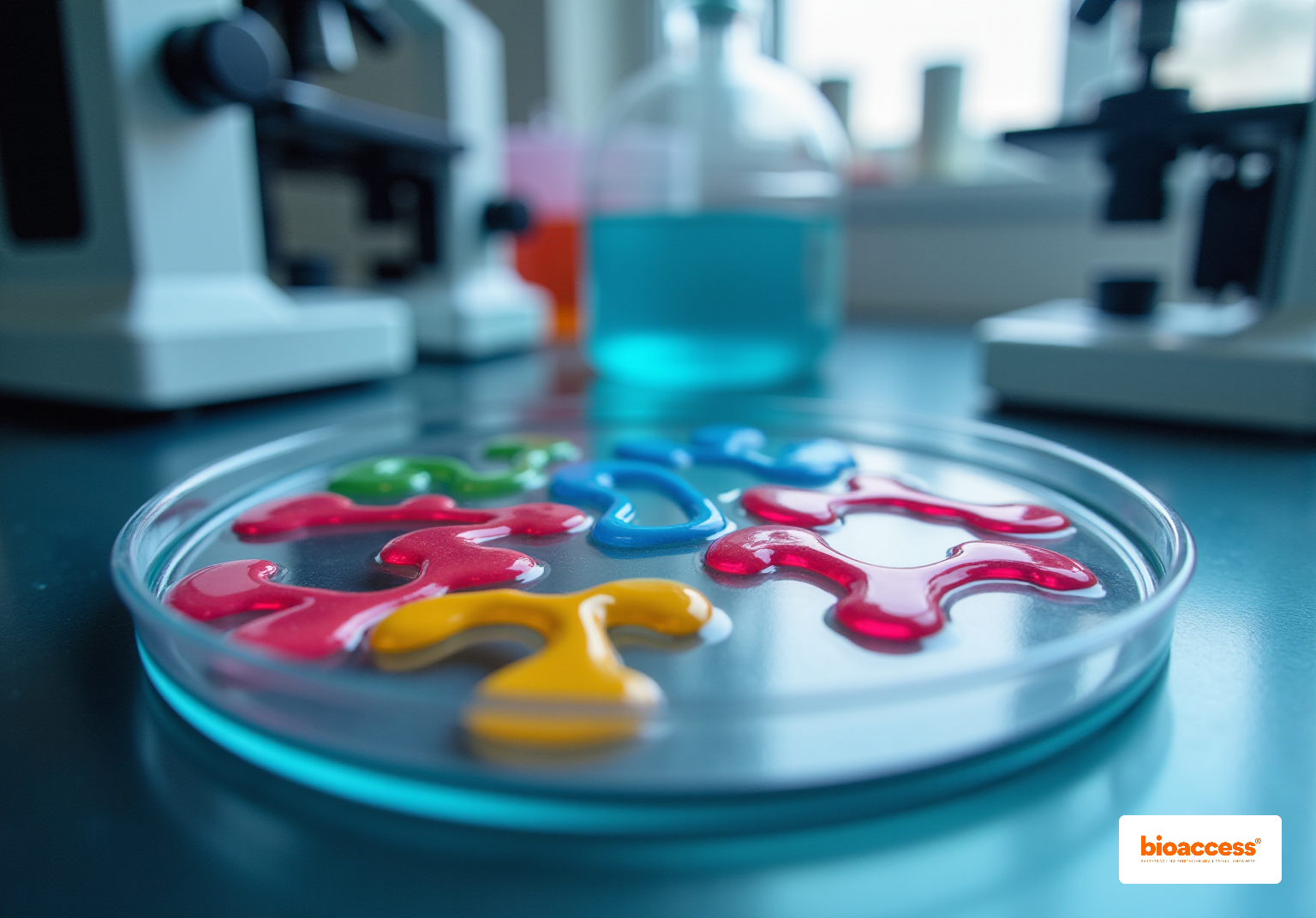


This article examines the various types of antibodies and their critical roles within the immune system, underscoring the essential function of antibodies in identifying and neutralizing pathogens. It delineates the functions of the five primary types of antibodies:
Each fulfilling distinct roles in sustaining immune health. Understanding these functions is paramount for advancing therapeutic strategies in immunology, highlighting the importance of this knowledge in clinical research.
Antibodies serve as the unsung heroes of the immune system—intricately designed proteins that play a crucial role in defending the body against foreign invaders such as bacteria and viruses. Understanding the various types of antibodies and their specific functions equips readers with valuable insights into how these remarkable molecules contribute to overall health and immunity. Given the complexity of immune responses and the evolving landscape of pathogens, one must consider:
Antibodies, also known as immunoglobulins, are specialized proteins produced by the body’s defense system in response to foreign substances called antigens, and they can be classified into different types of antibodies. Their role is pivotal in the body’s defense response, as they identify and neutralize pathogens, including bacteria and viruses. By binding to specific pathogens, antibodies signal these intruders for elimination by other defense cells, effectively preventing infections and illnesses. This remarkable recognition capability allows antibodies of different types to target a diverse array of antigens, making them essential for adaptive immunity, which provides lasting protection against previously encountered pathogens.
Recent research indicates that immune reactions constitute a significant portion of the immune system's effectiveness, with estimates suggesting they account for over 90% of immune activity in certain contexts. For example, studies have shown that neutralizing agents can substantially reduce the risk of severe illness and hospitalization due to infections, underscoring their importance in public health strategies.
Immunologists emphasize that a robust immune response is crucial for effective protection, particularly in the face of emerging pathogen variants. The latest findings regarding immunoglobulins highlight their evolving role in the body's defense, demonstrating that sustained levels of antibodies of different types can provide ongoing protection against reinfection, especially when complemented by vaccination efforts.
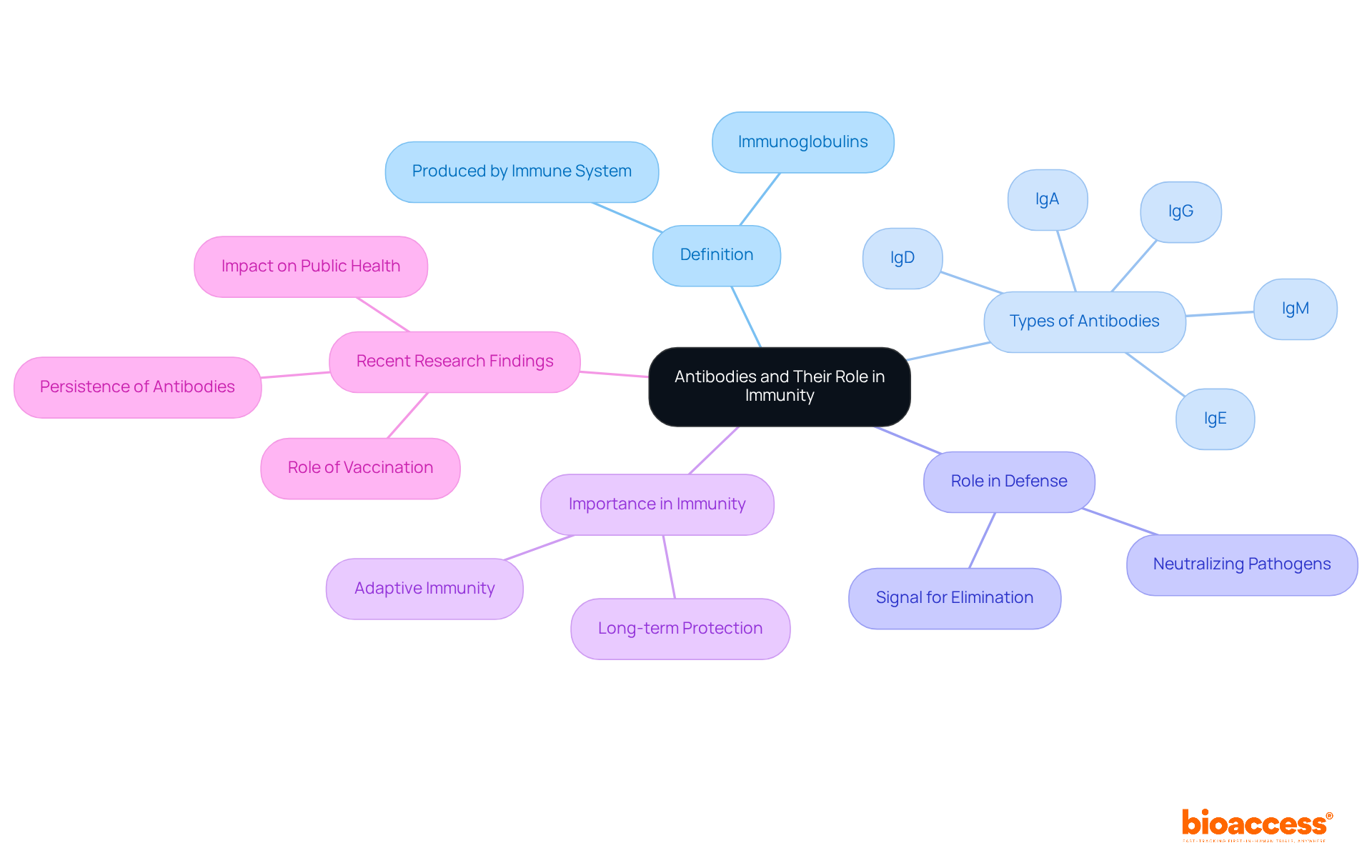
Antigens are external compounds that trigger a defense mechanism, while antibodies are specific proteins produced by the body's defense system to combat these antigens. In essence, substances can be viewed as 'invaders'—such as bacteria or viruses—while protective proteins serve as the 'defenders' that specifically target these intruders. Each of the antibodies different types is uniquely crafted to identify a particular foreign substance, ensuring an exact response from the body. This relationship is crucial for the defense system's operation, enabling targeted assaults on pathogens.
Recent research indicates that the efficacy of biological defenses can vary significantly based on the type of foreign substance involved. For example, approximately 10 million individuals in the US are affected by autoimmune diseases, underscoring the importance of understanding these interactions in immunology.
As highlighted by K. Haller-Kikkatalo, 'The presence of autoantibodies usually precedes autoimmune disease, but is sometimes considered an incidental finding with no clinical relevance.' This underscores the necessity for further investigation into how antigens trigger responses, as comprehending these mechanisms is vital for developing effective therapies.
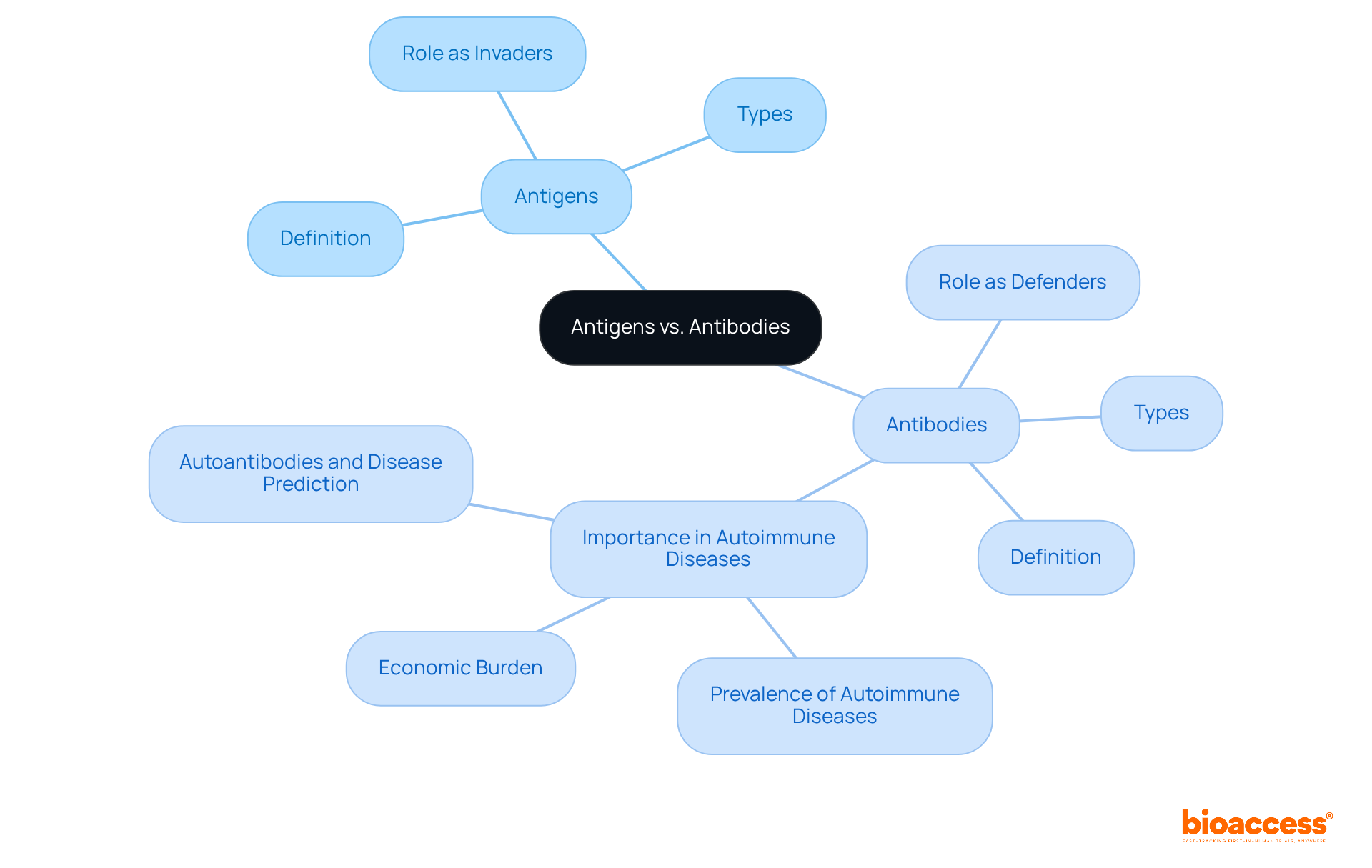
The five primary antibodies different types—IgG, IgA, IgM, IgD, and IgE—each fulfill unique functions in the immune response.
IgG: Comprising approximately 70% to 75% of all immunoglobulins, IgG stands as the most prevalent immune protein in the bloodstream. It offers long-lasting protection against pathogens and is essential for neutralizing toxins, establishing itself as a cornerstone of the adaptive defense system.
IgA: Predominantly found in mucosal areas such as the gut, respiratory tract, and saliva, IgA is vital for mucosal immunity. It forms dimers in secretions, effectively preventing pathogen entry and protecting against infections, particularly in newborns through breast milk, where it plays a critical role in safeguarding the gastrointestinal tract.
IgM: As the first antibody produced during an infection, IgM is instrumental in the initial defense of the body. It efficiently forms complexes with antigens and activates the complement system, enhancing the body's defense against pathogens.
IgD: Located primarily on the surface of B cells, IgD is involved in B cell activation and contributes to respiratory immune defense. Although its functions remain partially understood, it constitutes about 0.25% of immunoglobulins in the human body and is believed to assist in initiating immune response production.
IgE: This antibody is chiefly associated with allergic reactions and responses to parasitic infections. IgE binds to allergens, triggering histamine release from mast cells, which leads to allergy symptoms and provides a defense against parasites.
Antibodies different types, including IgG, IgA, and IgM, each play a crucial role in sustaining immune health, particularly in combating infections and illnesses. Understanding these functions is essential for advancing therapeutic approaches in immunology, including the application of monoclonal proteins in addressing various cancers and autoimmune conditions.
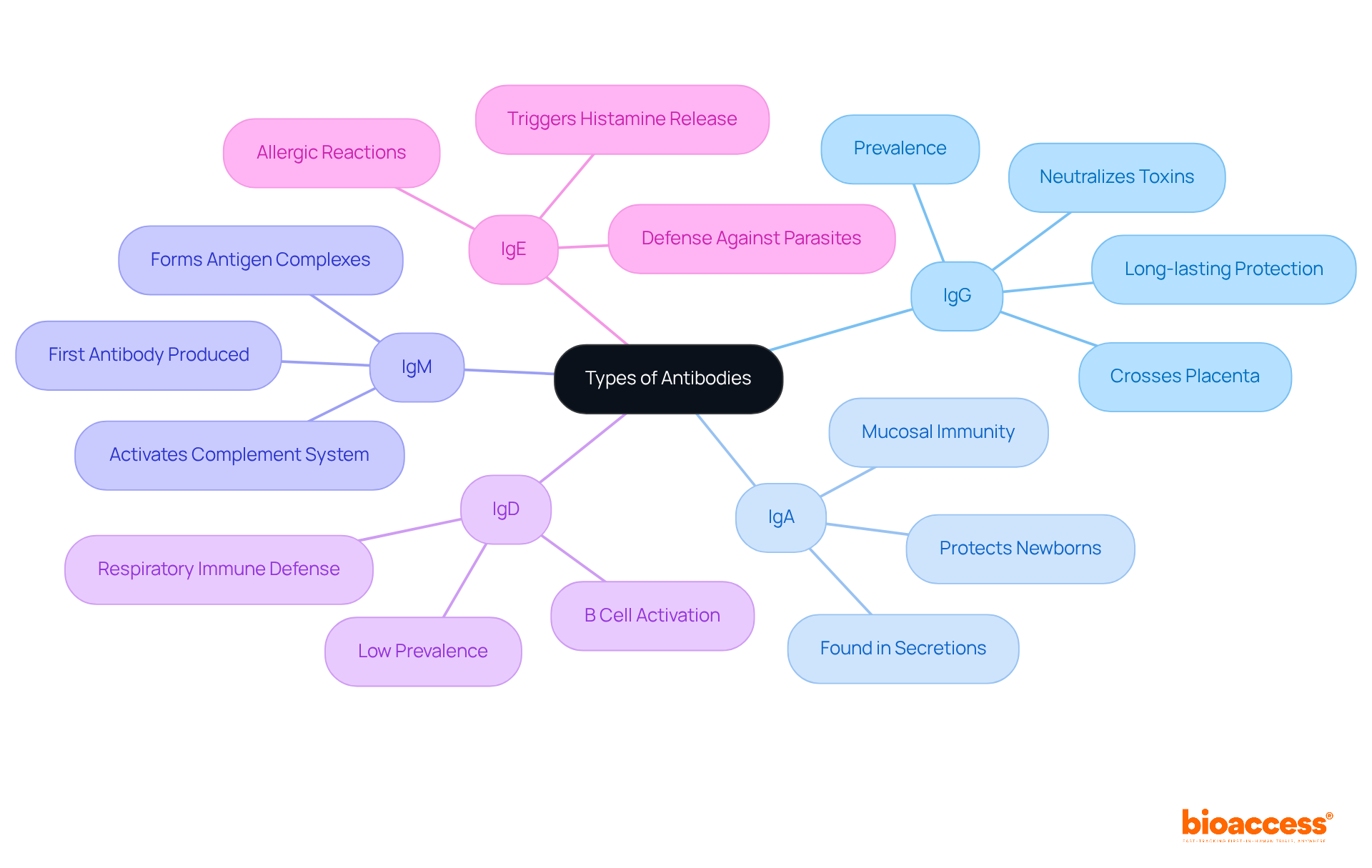
B cells, a specialized type of white blood cell, synthesize antibodies of different types. Upon encountering a foreign substance, B cells become activated and initiate clonal expansion, a crucial process where they proliferate and differentiate into plasma cells that produce immune proteins. Each immune protein is composed of four polypeptide chains: two heavy chains and two light chains, which together form a Y-shaped structure. The tips of this Y contain variable regions that specifically bind to antigens, while the stem region, referred to as the constant region, defines the immunoglobulin's class and functional role. This distinctive formation allows proteins to efficiently neutralize pathogens and stimulate various elements of the body's defense system.
Notably, IgG, the predominant immunoglobulin in human serum, constitutes 70-75% of total immunoglobulins, playing a crucial role in defense mechanisms. Furthermore, IgA accounts for 10-15% of total immunoglobulins in serum and is essential for mucosal immunity. The diversity of immunoglobulins is achieved through processes like somatic hypermutation and class switching, enabling a tailored defense against a wide range of pathogens.
Additionally, single B cell-based approaches offer significant advantages in immunoglobulin production, including the generation of a diverse array of these proteins with high specificity while requiring fewer animals than traditional methods. As Dr. Luis Vaschetto articulates, 'Antibodies, also referred to as immunoglobulins (IGs), are different types of glycoproteins created in reaction to a bodily defense trigger and demonstrate high specificity for the substances that provoke the reaction.' This underscores the vital function of antibodies in both therapeutic applications and the body's defense system.
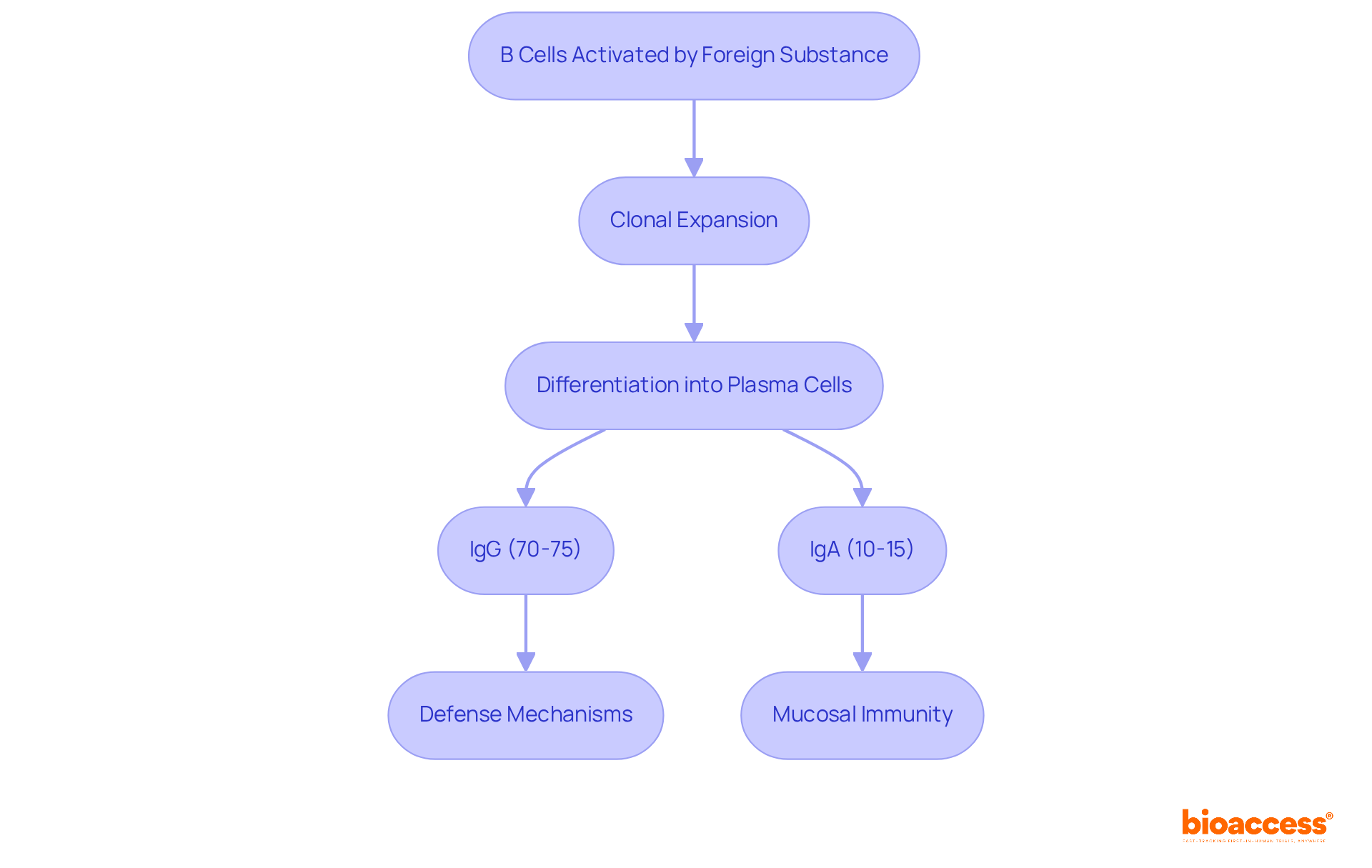
Monoclonal proteins (mAbs) are precisely engineered proteins derived from a single clone of B cells, designed to target specific antigens with remarkable accuracy. This specificity makes them essential in treating a range of diseases, including cancers, autoimmune disorders, and infectious diseases. Beyond their therapeutic roles, mAbs are also utilized for diagnostic purposes, enabling targeted drug delivery directly to cancer cells or the modulation of immune responses. Recent advancements in monoclonal therapies have further enhanced their efficacy, with applications spanning oncology, where they represent over 50% of the market value, and autoimmune diseases, driven by the increasing prevalence of conditions like rheumatoid arthritis.
Real-world examples, such as the use of mAbs in treating non-small cell lung cancer, underscore their transformative impact on treatment protocols in modern medicine. The ongoing development of bispecific antibodies and antibody-drug conjugates illustrates the potential for mAbs to address complex diseases, solidifying their role as a cornerstone in contemporary therapeutic strategies.

Antibodies are fundamental components of the immune system, serving as specialized proteins that protect the body from various pathogens. Their diverse types—IgG, IgA, IgM, IgD, and IgE—each fulfill unique roles, contributing to a robust defense mechanism against infections and diseases. By understanding the intricacies of these proteins and their functions, individuals can appreciate their significance in maintaining health and combating illnesses.
The article highlighted the critical distinctions between antibodies and antigens, emphasizing how antibodies are tailored to identify and neutralize specific invaders. It further explored the production of antibodies by B cells and the transformative potential of monoclonal antibodies in therapeutic applications. With a strong focus on the importance of these proteins in adaptive immunity and public health, the insights presented underscore the necessity for continued research and understanding in the field of immunology.
Recognizing the vital role of antibodies not only enhances therapeutic strategies but also empowers individuals to make informed health decisions. As the landscape of pathogens evolves, staying informed about antibody functions and their implications for health becomes increasingly important. Engaging with this knowledge can lead to better health outcomes and a deeper understanding of the body's remarkable defense system.
What are antibodies and what role do they play in immunity?
Antibodies, also known as immunoglobulins, are specialized proteins produced by the body’s defense system in response to foreign substances called antigens. Their role is crucial in identifying and neutralizing pathogens, such as bacteria and viruses, thereby preventing infections and illnesses.
How do antibodies function in the immune response?
Antibodies bind to specific pathogens and signal these intruders for elimination by other defense cells. This recognition capability allows antibodies to target a diverse array of antigens, making them essential for adaptive immunity, which provides lasting protection against previously encountered pathogens.
What is the significance of immune reactions in the immune system?
Immune reactions constitute a significant portion of the immune system's effectiveness, accounting for over 90% of immune activity in certain contexts. They are crucial in reducing the risk of severe illness and hospitalization due to infections.
How do antibodies contribute to protection against emerging pathogen variants?
A robust immune response, characterized by sustained levels of antibodies, is essential for effective protection against emerging pathogen variants. This ongoing protection is particularly enhanced when combined with vaccination efforts.
What is the difference between antigens and antibodies?
Antigens are external compounds that trigger a defense mechanism, while antibodies are specific proteins produced by the body's defense system to combat these antigens. Antigens can be viewed as 'invaders,' and antibodies serve as 'defenders' that specifically target these intruders.
Why is understanding the interaction between antigens and antibodies important?
Understanding these interactions is vital for developing effective therapies, particularly in light of the varying efficacy of biological defenses based on the type of foreign substance involved, as evidenced by the prevalence of autoimmune diseases.
What are autoantibodies, and why are they significant?
Autoantibodies are antibodies that target the body’s own tissues, and their presence usually precedes autoimmune diseases. Understanding their role is important for investigating how antigens trigger immune responses and for developing therapeutic strategies.